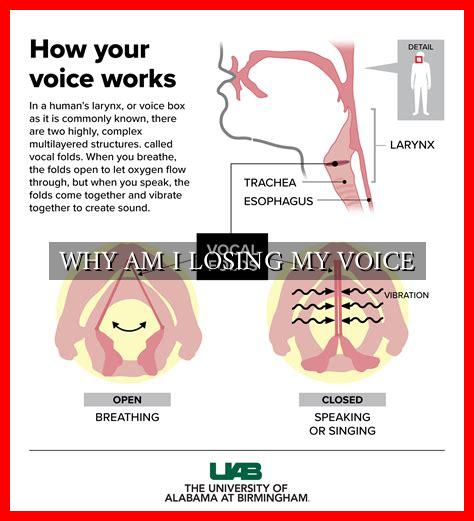-
Table of Contents
Why Am I Losing My Voice?
Have you ever experienced hoarseness, raspiness, or even complete loss of your voice? If so, you’re not alone. Many people encounter voice problems at some point in their lives, and the reasons behind these issues can vary widely. In this article, we will explore the common causes of voice loss and provide insights on how to prevent and treat this frustrating condition.
Common Causes of Voice Loss
There are several factors that can contribute to the loss of your voice. Some of the most common causes include:
- Acute laryngitis: This is a temporary inflammation of the vocal cords due to a viral or bacterial infection. It can result in hoarseness or complete loss of voice.
- Chronic laryngitis: Long-term irritation of the vocal cords, often caused by smoking, acid reflux, or overuse of the voice, can lead to persistent voice problems.
- Vocal cord nodules or polyps: These are growths on the vocal cords that can interfere with vocal cord vibration, resulting in voice changes.
- Stress and anxiety: Emotional stress and anxiety can cause tension in the muscles surrounding the voice box, leading to voice problems.
- Overuse of the voice: Yelling, singing loudly, or speaking for extended periods without proper vocal rest can strain the vocal cords and cause voice loss.
Prevention and Treatment
Fortunately, there are steps you can take to prevent voice loss and improve vocal health.
. Here are some tips to keep your voice in top condition:
- Stay hydrated: Drink plenty of water to keep your vocal cords lubricated and prevent dryness.
- Avoid irritants: Limit your exposure to smoke, pollution, and other environmental factors that can irritate the vocal cords.
- Practice good vocal hygiene: Avoid yelling or speaking loudly for extended periods, and give your voice regular breaks.
- Seek professional help: If you experience persistent voice problems, consult a speech therapist or otolaryngologist for evaluation and treatment.
For more severe cases of voice loss, medical intervention may be necessary. Treatment options can include voice therapy, medication, or surgery, depending on the underlying cause of the problem. It’s important to address voice issues promptly to prevent long-term damage to the vocal cords.
Case Study: Singer’s Struggle with Voice Loss
One famous example of voice loss is singer Adele, who experienced vocal cord hemorrhage in 2011, leading to the cancellation of several tour dates. She underwent vocal cord surgery and took an extended break from singing to recover. Adele’s experience highlights the importance of vocal health and the impact that voice problems can have on professional singers.
Conclusion
Voice loss can be a frustrating and debilitating condition, but with proper care and attention, it is often preventable and treatable. By understanding the common causes of voice problems and taking steps to maintain vocal health, you can protect your voice and prevent future issues. Remember to listen to your body and seek help if you experience persistent voice changes. Your voice is a valuable asset, so take care of it!





